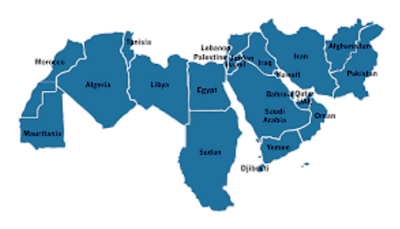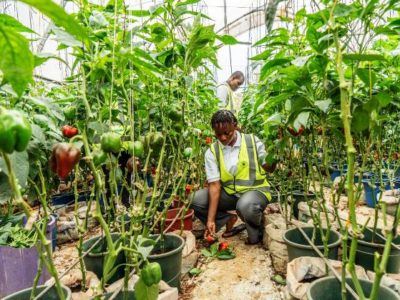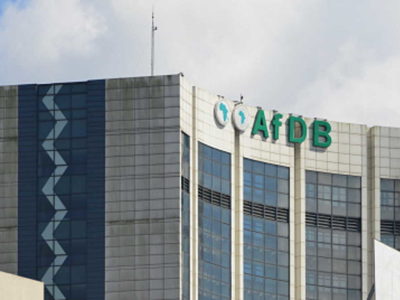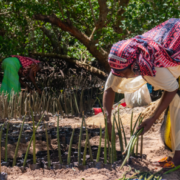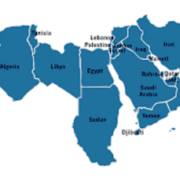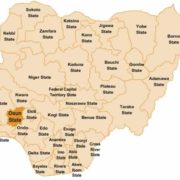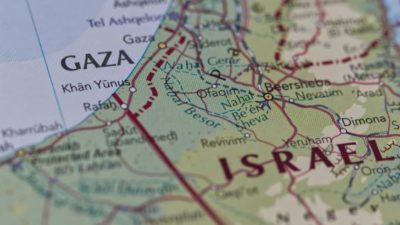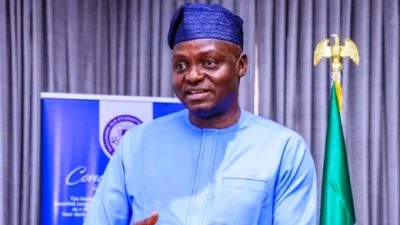Rwanda’s High Commissioner to Nigeria, His Excellency Joseph Habineza, interacts with Baobab Media editorial Think Tank, Segun Oruame and Joe Anuga, in Abuja on Rwanda’s economic and political pathway in the post genocide years. Habineza speaks on lessons Nigeria and other African countries can learn from Rwanda to foster national unity and economic development.
ANUGA: Your Excellency, there is always the question of whether we are learning enough from history and it appears in the case of Rwanda, we as Africans are not learning enough. If you look at the genocide that took place and the history of divisions and how such divisions led to genocide and how there has been a conscientious political arrangement to resolve the conflicts in a peaceful way among other processes to address the fault lines; I think Africa can learn from Rwanda and indeed, Africa needs to learn.
HE JOSEPH HABINEZA: Africa is divided because it suited its colonial masters to divide it so that they could exploit it. They instituted divide and rule inside every colony on ethnicity and religion. In Rwanda, we have three ethnic groups, but all of those three groups speak the same languages, they have the same culture, and all believe in one God. Even when the Europeans came to teach us their own religion; and other religions whether Christianity or Islam encroached into our lands, they didn’t change the name of God or our understanding of God, because to Rwandans, God is one and God is called Imana. So divisions came with colonial rule. Before the idea of European colonies, our society was a well organized around one king who had the prerogative of God on earth and everybody respected that king and the king was devoted to his country and his people and he protected them. Slave raiders could not enter our country, our king protected his people. Slave traders could not penetrate, they came to where the king, Gihanga, was staying. The king was known as the strong man and they could not break into his territory, the high mountain of Rwanda. You can understand the attitude, the sense of oneness among the people. So the Europeans now tried to penetrate it by dividing the people. They conceived divisive ideas and encouraged the kings after Gihanga to accept those ideas, they told the kings, you look like European; you are semi European; you are different from those others, they are Africans; they are blacks, you are like Europeans. They penetrated our territory in the early 1900s with such ideas. The king during their entry resisted them that he should be baptized to be a Christian; they impeached him, arrested him and deported him to Congo. He was on exile and they put his son who was ready to be baptized, who then dedicated Rwanda to the Virgin Mary and the country officially became a Catholic country; Protestants who were minority, sometimes got persecuted. Along the way, people started canvassing for political independence and democracy. The king who they felt understood them later was interacting with a number of people who wanted independence; that agitated the colonial masters and that king died somewhat in controversial circumstances, they then installed his brother because he didn’t have kids. Once his brother was made the king, the tensions increased. People wanted political independence and the Europeans and those benefitting from them didn’t want it. People were called to go on a strike, to cause the revolution so the people who were saying they were being oppressed took power by killing, they tried to kill all the chiefs, all those who were identified to be in power. Many ran away from the country. They ran to neighboring countries in 1959, We got independent in those kind of conditions and the government who held power didn’t want to really bring those who went into exile back, he said stay where you are, even when they tried to come back fighting, and any time they struck they are accused of killing the country. That was the condition the first government had to contend with and that defined the politics and situation in Rwanda with all subsequent governments. There were Rwanda refugees camps in other countries with repeated attempts by those in these camps to return home and there were also repeated attempts to prevent them. Consequently, there were series of uprisings, series of armed conflicts within Rwanda and the refugees’ camps and series of negotiations. It went on from 1962 to 1994. Many who were born and grew up as refugees always would say that they have a country they have to go back to. They tried to negotiate with the government but the government said no, you cannot come into the country; the country is too poor to accommodate you. Now, you are talking of people who have been involved in armed conflicts in the neighboring countries. Many of them have been involved in the Uganda wars. From 1991 and eventually to 1994 when the genocide took place, there were negotiations and threats of wars and insistence of returning home by those outside. Eventually, there was total breakdown of order; chaos and then genocide – one million people killed within a month.
“The commitment from [the Rwandan people] is remarkable. Imagine a civil servant giving up his one month salary; business people even cleaners committing a high percentage of their earning to the national purse. People are sending SMS to contribute and one SMS is equivalent to 12.5 cent. You see this kind of thinking and action demonstrates that the citizen knows the value of having a country.
ORUAME: So you could say the genocide was the climax of several strictures and was the beginning of new thinking?
HE JOSEPH HABINEZA: I just want to explain to you the past of Rwanda. After the genocide, the country sank deeper than anybody could have ever imagined, everything was down including, of course, infrastructures. People were forced to start thinking; we had to review everything. How and what caused those problems and where do you want to go. We knew we had to secure, stabilize and pacify the country, making sure everyone feels at home as a Rwandan. We knew we had to ban any discrimination whether ethnic, region or religion. We put all these in our constitution. You are first and foremost a Rwandan before anything else. You can claim to be a Hutu or a Tutsi or a Twa but that will be inside your home. In public spaces, the constitution does not allow you to start calling ethnic or religious identity to do politics. That is why we have problems with the opposition. An opposition has to be in ideas or projects or programmes as to moving the whole of Rwandan forward. An opposition that seeks to play up ethnicity or religion is not allowed because even in European countries, such parties are abhorred. They have no place in Europe, parties based on tribes seeking to control the centre. We have to learn from the mistakes of the past. During the first and second republic, they were quota for everything particularly education like Hutu are 85%, Tutsi are 14%, Twa 1%. Before now in our country, people will do just only primary school; to go to secondary school was a privilege and the quota system was used to determine who gets what. If 100, 000 made primary schools, and 10, 000 would make the secondary schools while 1000 would make the university, entry would be determined by quota. They would say 85% must be Hutu 14% will be Tutsi and 1% will be Twa. Everything was based on ethnicity and region; north and south. How can you ever understand how to make things work with that kind of arrangement? How can you ever move a country forward? When we started regionally, the north appeared to have gained more. Of cause, the army and the leaders then were from the north, anything will be for the north. The quota thing and the regional thing was even more problematic and more frustration. We have removed all that and now you are simply a Rwandan citizen. In Rwanda now, education is free for all; twelve years basic and mandatory education, that means every one is sure of having education from P1 to senior secondary. In the beginning it was tough to meet this goal because there were no infrastructures and no human resources. People contributed to it. In communities, people were building schools while government will buy books, installed windows and chairs. Communities were committed to development. In the whole country we decide to change the teaching languages from French to English. We didn’t have professors so we asked professors from Uganda and they came and during holiday the local teachers were having English courses, they all now speak English, you see.
I am trying to show how much determination has gone into changing Rwanda by the government and the people. In 2007, the government conceived its Vision 2020 – I think Nigeria has vision 2020 too. We looked at where we were and looked at where we want to go. We looked at where we have to focus on. We knew we have to focus on an IT or Knowledge based economy. We also have to invest in the people. We started with free health care for everybody. We started education for all and open our country for business, tourism and all that. We looked at where we have a competitive advantage as a small country. We knew we needed to focus on a high income tourists. As a small country, massive tourists consisting largely of low income earners won’t augur well for us. Our products are mountain gorilla, tourists will need to pay up to $750 each to visit the area. We open our country so we modernized our airport and hospitality industry; build hotels and make our country clean. We knew we don’t need a lot of money to make the environment clean, what you need is the people. If you come to Kigali, you will be surprise at the level of cleanliness. When you arrive at the Rwandan airport, they ask you for your fibre plastic bag, where you will throw in your thrash. Every last Saturday we have environmental day.

ORUAME: What has happened is like a cultural revolution. Re-engineering the minds of the people to look at themselves and their country differently from the way they use to look at themselves and the country in the past. People have been taught to consider themselves as Rwandan first and to think less of themselves as ethnic beings. The government then turn to the economy. The question of how to empower the people, create sustainable income; embark on privatization and let private people take over business as part of its Vision 2020.
HE JOSEPH HABINEZA: Yes of course you know government has no business in business because government doesn’t have good managers. Government is good only at designing policy, monitoring projects and embarking monetary control. Business is best in the hands of private sector players. In terms of right business environment we are globally ranked above 40 but we are ranked among the first in Africa. We are actually third after South Africa and Mauritius in terms of competitive and transparency in doing business. There is no bureaucracy to open a business in Rwanda. It takes hours not days or weeks.
ORUAME: Nigeria and Rwanda share a common history. Are you looking at furthering relationship with Nigeria through exploring businesses though Nigeria’s private sector entrepreneurs?
HE JOSEPH HABINEZA: Yes actually am trying to attract Nigerians to Rwandans and Rwandans to Nigeria because Nigerians are really fast in doing business. We want to start in real estate, then the oil companies. We have Rwandans bringing their experience and exporting the market there. But first I see a need for cultural rethinking where people have been oriented in this real quick money from oil. Nigerians are naturally fast thinking entrepreneurs. But Nigerians can also learn to do business by contributing to the government of the country and to think more of their country and less of themselves. Here, people think more about themselves and their businesses. Social responsibility is really lacking. When the donor countries threaten to stop their contributions, aids and everything, what did Rwanda do? We created our own development fund and under one month we raised over 30 million dollars that Rwandans contributed – from the small cleaner to the highest business entities. Everyone voluntarily contributed. Even if it is one kobo, it is dignity; actually it is called the Dignity Fund.
ORUAME: Is it close to what the donor countries give?
HE JOSEPH HABINEZA: No. But it is the commitment that is remarkable. Imagine a civil servant giving up his one month salary; business people even cleaners committing a high percentage of their earning to the national purse. People are sending SMS to contribute and one SMS is equivalent to 12.5 cent. You see this kind of thinking and action demonstrates that the citizens know the value of having a country.
ORUAME: Rwanda is not unique in terms of crisis. Like several other African countries, it has had its own share of conflicts and wars. What appears unique about Rwanda is how it has been able to manage its past and implement turnaround process that is both political and economic. When I look at your country and look at other countries, say Sierra Leone, Liberia, Uganda and even Nigeria, I am trying to figure out the speed at which you have experienced your turnaround, could it be because of the unique leadership of President Kagame , is it because of the people tired of war and a terrible past and desirous of change? Give me four factors that made Rwanda what it is, assume I am a primary school pupil seeking simple answers to difficult questions.
HE JOSEPH HABINEZA: In Rwanda, first of all, the success came from the leadership, because somebody like Kagame should be somebody who wants revenge, because all Rwandans whether Tutsi, Hutu or Twa lost their people in this genocide, so if he had said now I am the winner of this war let me take revenge, we wouldn’t have concentrated on development we would have concentrated on revenge. But he re-united the people. He said come and they came out; let us build a nation for everyone. And he has been able to do it. Secondly, is that the people now have a say in their own country and they have a mindset to do something for their country. Thirdly, all of us said what happened before we don’t want it again, so now every Rwandan is in caution. The genocide is a past that must not repeat itself. Another factor is our resilience, that thing is in our nature. As Africans we never give up.
ANUGA: What about the fact that probably there was deep international sympathy with the Rwandan tragedy?
HE JOSEPH HABINEZA: The international communities. Don’t trust them. If they were really sympathetic, they should have showed it in 1994 because they abandoned the people. You came to the same people and said all I will take would be only my fellow Nigerians even if they are married, even if they had kids, even if they had friends, you were only interested in those that were your citizens by birth. You took only those you felt belong to you. Maybe the international community is led by guilt and has tried to assuage that guilt-feeling by trying to help. They will bring you this money and spell the conditions for its use. They will also bring you assistance that reduces you as a country. First of all, we refused food aids. The government said if you want to give us food give, us crops so that we can develop our agriculture. There was tension between the government and the UN when we refused the food aids. During the genocide, the UN ran away and now they want to monitor peace, which kind of monitor do they want to do? We told them if that is what you want, go away, we don’t want you, and that was the crisis.
ORUAME: Earlier, I raised the point that Africa doesn’t trade with itself and that is impacting negatively on potential area of growth within the continent. I know Rwanda is relatively far from Nigeria but you said you are exploring areas of business cooperation. Are you really looking at culture relationship, education relationship say between the universities and between the community of young Nigerian entrepreneurs and their counterpart in Rwanda?
HE JOSEPH HABINEZA: First of all, we are strengthening relationships and bringing our people closer. Rwandair is now doing several flights per week between Kigali and Lagos. There is already some level of exchange between our educational institutions. About 14 students from Rwanda came to the American University in Nigeria; Nigeria students will also be going to Rwanda. We have technology schools that will form part of the exchange which is very good. We have had our military officers come to Jaji, the military training institutions there. But we are expanding the relationship to business. Access Bank is in Rwanda, IGI is in Rwanda and recently a lot of other companies are beginning to enter Rwanda from Nigeria.
Dr. Anuga is on Baobab Think Tank. He lectures Political Science at the University of Jos. Oruame is vice chairman, editorial Think Tank @ Baobab Media.


